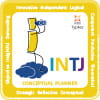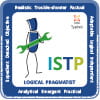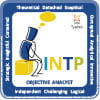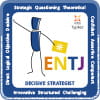Type and Appreciation - Part 1
Michael Segovia, lead facilitator for the MBTI Certification Program, CPP, Inc.
This blog looks at how the 16 MBTI types approach thankfulness and show their appreciation. It was written by Michael Segovia, who is the lead facilitator for the MBTI Certification Program at CPP, Inc., and was published as a 16-part series on www.cpp.com earlier this year.
We're publishing Michael's blog in two parts, split by T–F (Thinking and Feeling) preferences. This part features descriptions for the eight Thinking types, and part two covers the Feeling types. Click on a T-tile below to jump straight to the description.
 |
 |
 |
 |
 |
 |
 |
 |
 |
 |
 |
 |
 |
 |
 |
 |
ISTJ
Showing appreciation may not come naturally to you. Try to offer more positive comments to the important people in your life.
 This links to the ‘bottom-line’ approach of people with preferences for ISTJ. Those who prefer Sensing and Thinking tend to want to get to the point. As a result, they might not stop to consider others who they are thankful for as much as some would want. Of course, as we each develop, we should learn to understand the other side of our preferences. If your preferences are for ISTJ, you might find a much more openly appreciative approach to others as you age and develop. If you are not there yet, then now is as good a time as any to flex your approach when appreciating others.
This links to the ‘bottom-line’ approach of people with preferences for ISTJ. Those who prefer Sensing and Thinking tend to want to get to the point. As a result, they might not stop to consider others who they are thankful for as much as some would want. Of course, as we each develop, we should learn to understand the other side of our preferences. If your preferences are for ISTJ, you might find a much more openly appreciative approach to others as you age and develop. If you are not there yet, then now is as good a time as any to flex your approach when appreciating others.
INTJ
Being self-reliant, you may not see the importance of regularly appreciating others. Make a point of sharing kind words and deeds.
 This description connects to the Introverted iNtuition approach often taken by individuals with preferences for INTJ. I know some INTJ colleagues who, in an effort to make a more conscious effort toward appreciating others, will add reminders to their calendar. It helps them come out of their independently innovative world so they can connect just a bit more with those who need it.
This description connects to the Introverted iNtuition approach often taken by individuals with preferences for INTJ. I know some INTJ colleagues who, in an effort to make a more conscious effort toward appreciating others, will add reminders to their calendar. It helps them come out of their independently innovative world so they can connect just a bit more with those who need it.
Of course, if you have INTJ preferences, it’s no doubt important for you to get some time by yourself or with just one other person. Be careful not to fill your calendar too much or you might find yourself worn out.
ISTP
You probably like to do something for people rather than give them compliments. Hand out some praise. Some people need to hear your appreciation.
 A practical, hands-on approach is often shown by individuals who prefer ISTP. If you have ISTP preferences, making and/or fixing things around the house might be a great way for you to show appreciation. But, keep in mind that your friends may want some time to interact with you as well.
A practical, hands-on approach is often shown by individuals who prefer ISTP. If you have ISTP preferences, making and/or fixing things around the house might be a great way for you to show appreciation. But, keep in mind that your friends may want some time to interact with you as well.
I was in a relationship for many years with someone with ISTP preferences. I had to remind myself that his way of saying he cares and showing appreciation for me was to fix or make something, while I needed to hear it more. He thought he was saying it by what he did. Fortunately, we understand that more now and have remained friends.
INTP
You may not naturally tend to offer much appreciation. Observe people and decide when more positive comments and actions are needed.
 This relates to the approach frequently taken by individuals who prefer INTP: analyzing the situation for logical consequences. As a result of constantly analyzing pros and cons, they may completely forget to stop and outwardly express their appreciation of others. As I have mentioned for INTJ, I have colleagues who will add a note in their calendar to remind them to thank people in their life more regularly. I’m not suggesting that you fake praise – when you do, others will know – but when you notice something others have done that you find helpful, try to make it a point to verbally show that you appreciate it.
This relates to the approach frequently taken by individuals who prefer INTP: analyzing the situation for logical consequences. As a result of constantly analyzing pros and cons, they may completely forget to stop and outwardly express their appreciation of others. As I have mentioned for INTJ, I have colleagues who will add a note in their calendar to remind them to thank people in their life more regularly. I’m not suggesting that you fake praise – when you do, others will know – but when you notice something others have done that you find helpful, try to make it a point to verbally show that you appreciate it.
ESTP
You may show appreciation for others with impromptu or unexpected actions. Be sure these surprises don’t disrupt someone’s plans.
 A playful here-and-now approach often gets shown by individuals who prefer ESTP. Mixing fun with work is a great way for them to break things up, maintain momentum, and continue moving forward. For others (likely those who prefer FJ and TJ), however, this spontaneous approach might be seen as an impediment to their process. So if your preferences are ESTP, check with others’ schedules before you show your appreciation using your typical fun approach so that you don’t disrupt their process.
A playful here-and-now approach often gets shown by individuals who prefer ESTP. Mixing fun with work is a great way for them to break things up, maintain momentum, and continue moving forward. For others (likely those who prefer FJ and TJ), however, this spontaneous approach might be seen as an impediment to their process. So if your preferences are ESTP, check with others’ schedules before you show your appreciation using your typical fun approach so that you don’t disrupt their process.
ENTP
You acknowledge other people’s competence and innovation. Remember also to celebrate special dates for them and reward their efforts.
 This reflects how people with preferences for ENTP tend to show appreciation for new ideas. Changing things up to make the organization better is a big part of what drives them. As a result, their showing outward appreciation and warmth to others may not come across as much. If your preferences are ENTP, it might help to remember that happy people tend to do better work and stay longer in their job. Happy people in our personal life also tend to stay. The trick is to remember that different things make different people happy.
This reflects how people with preferences for ENTP tend to show appreciation for new ideas. Changing things up to make the organization better is a big part of what drives them. As a result, their showing outward appreciation and warmth to others may not come across as much. If your preferences are ENTP, it might help to remember that happy people tend to do better work and stay longer in their job. Happy people in our personal life also tend to stay. The trick is to remember that different things make different people happy.
ESTJ
You may think that work well done is its own reward. Others may need more verbal encouragement and support.
 The ‘get-it-done’ attitude is often shown by individuals who prefer ESTJ. For them, checking things off the list as done well and completed is often a reward in itself. “Why do we need to celebrate beyond that when we could be moving on to completing something else?” is what one colleague once asked me. If your preferences are ESTJ, just keep in mind that some people need to stop and be recognized in order to feel appreciated. A big ‘thank you’ and ‘you made a difference’ is the fuel they occasionally need to get back up and going again. That might feel like a waste of time to you, but it is crucial for others.
The ‘get-it-done’ attitude is often shown by individuals who prefer ESTJ. For them, checking things off the list as done well and completed is often a reward in itself. “Why do we need to celebrate beyond that when we could be moving on to completing something else?” is what one colleague once asked me. If your preferences are ESTJ, just keep in mind that some people need to stop and be recognized in order to feel appreciated. A big ‘thank you’ and ‘you made a difference’ is the fuel they occasionally need to get back up and going again. That might feel like a waste of time to you, but it is crucial for others.
ENTJ
You may not proclaim your appreciation of others, though you rely on and expect more from people you deem competent. Offer them some praise.
 This description relates most to the iNtuition and Thinking processes of this type. Competence is often one of the most important values for individuals who prefer ENTJ (this is also the case for INTJs, INTPs, and ENTPs). Try adding calendar reminders to offer praise (genuine only) to people in your work and personal lives. Doing something competently is just one reason to be praised. Being someone who makes a difference in other people’s lives is another.
This description relates most to the iNtuition and Thinking processes of this type. Competence is often one of the most important values for individuals who prefer ENTJ (this is also the case for INTJs, INTPs, and ENTPs). Try adding calendar reminders to offer praise (genuine only) to people in your work and personal lives. Doing something competently is just one reason to be praised. Being someone who makes a difference in other people’s lives is another.